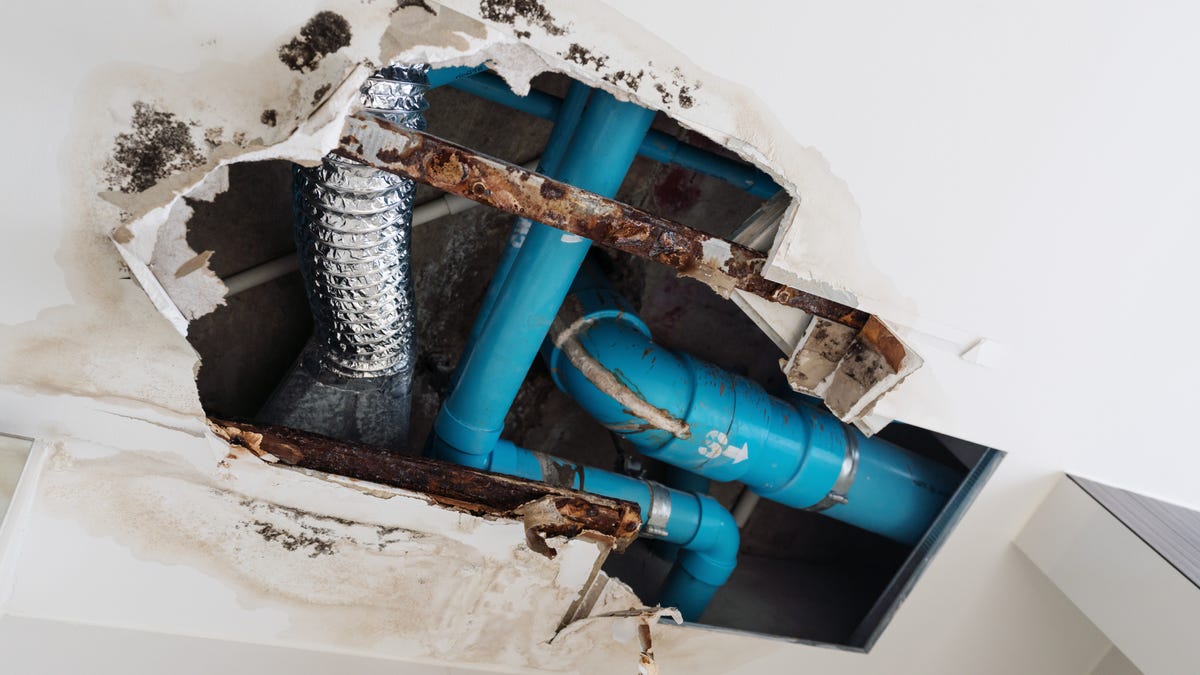 Why You Can Trust CNET
Why You Can Trust CNET 6 Tips to Prevent Frozen Pipes and Costly Repairs This Winter
Save yourself a big headache and a big bill by avoiding burst pipes.

Spot leaks early to reduce your chance of water damage.
Winter is officially in full swing, and as a homeowner it's best to take preventative measures to avoid broken or burst pipes in your home. Meteorologists are predicting an El Niño winter this year, which can be a homeowner's worst nightmare -- weather conditions are wetter and the temperatures are lower, raising the risk of freezing pipes if you don't prepare.
Avoiding the headache of frozen pipes is well worth your time investment, as it can ultimately save you anywhere between $400 and $1,500-plus in repair costs for the pipes alone, not to mention the water damage in your house. The average insurance claim in 2022 for frozen pipes was more than $20,000, according to State Farm.
Whether or not you travel this winter, you can have peace of mind knowing your pipes are in good condition. Implementing these expert tips in your winter home maintenance routine, especially during times of severe cold snaps, can keep you and your household comfy and cozy all winter long.
Looking for more home tips this winter to keep you warm and more money in your wallet? Learn how to save money on water heating costs, stay warm using your ceiling fan and set your thermostat for comfort and savings.
Cover exposed pipes
When your water supply pipes are exposed, they're more susceptible to freezing and bursting, especially if they're located along exterior walls or in unheated spaces like a basement or attic. To prevent this, it's a good idea to protect pipes with insulation.
Covering your exposed plumbing is one of the cheapest and easiest ways to prevent burst pipes. Your local hardware store will have several different materials that you can use to insulate your pipes, including foam and fiberglass insulation. You can even use newspaper to cover your exposed pipes if you live in a place where freezing temperatures only happen on occasion.
Insulate unheated areas
When you have plumbing running through an unheated basement, attic, garage or crawl space, the pipes don't get as much warmth as they would in a heated bedroom or living room. By insulating the unheated areas in your home, your pipes will stay warmer and be less likely to burst. Plus, well-insulated homes contain heat more effectively, which can save you money on winter heating bills.
If you're the DIY type, you should be able to add insulation on your own. Otherwise, you can hire a professional to do it for you. Either way, it's a cost-effective and energy-efficient way to protect your pipes and keep your home at a comfortable temperature.
Keep a tap running on cold days
You might be surprised to find out that something as simple as running a tap can help prevent frozen pipes. But in reality, it's one of the most effective things you can do. You don't need to leave your tap running at full blast, but make sure you've at least got a slow drip.
For the best results, choose the faucet that's furthest away from your water source. Doing this will force the water to run through a large portion of your plumbing system, keeping it active and less likely to freeze. Similarly, if you have any taps that are served by exposed pipes, it's a good idea to keep them trickling as well.
Open bathroom and kitchen cabinet doors
Another small (but useful) strategy to prevent burst pipes is to open the cabinet doors under your kitchen and bathroom sinks. By doing so, the heated air from your home will start to circulate beneath your cabinets and warm up your pipes.
It's particularly important to open your cabinet doors if they're located along an exterior wall of your home. As you might expect, pipes in these areas are more likely to freeze since they're closer to the cold outdoors.
Don't adjust your thermostat
You may be familiar with the Department of Energy's recommendation to adjust your thermostat during the winter to save energy, but that guidance doesn't apply during a cold snap.
Get a smart thermostat and take control of your home's temperature and heating schedule whether you're home or away. The Amazon Smart Thermostat is CNET's choice for best overall smart thermostat, but you can check out all of our best smart thermostat picks to see if there's one that better fits your needs. The Amazon Smart Thermostat can be had for $60 at Best Buy.
Instead, you should keep your thermostat at a constant temperature throughout the day and night. Doing this will help your pipes stay warmer, making them less likely to freeze and burst. Plus, maintaining a steady temperature will put less stress on your furnace, which is important during periods of extreme cold.
Seal leaks and drafty areas
Our final tip to prevent burst pipes this winter is to patch up drafty areas in your home. When you have gaps or leaks between the inside and outside of your home, it's possible for cold air to come in, lower the temperature around your plumbing and cause your pipes to burst.
The good news: it's easy to seal these leaks. Get started by taking a quick walk around your house and looking for any places where air could sneak in, including window and door frames, electrical wiring and dryer vents. Once you've identified the problem areas, use insulation or caulk to seal them up.
The bottom line
Even if home maintenance isn't your strong suit, you should be able to tackle all of these repairs in a single weekend. It may seem inconvenient, but making these minor upgrades is a small commitment that can prevent serious headaches and expensive repairs in the future.